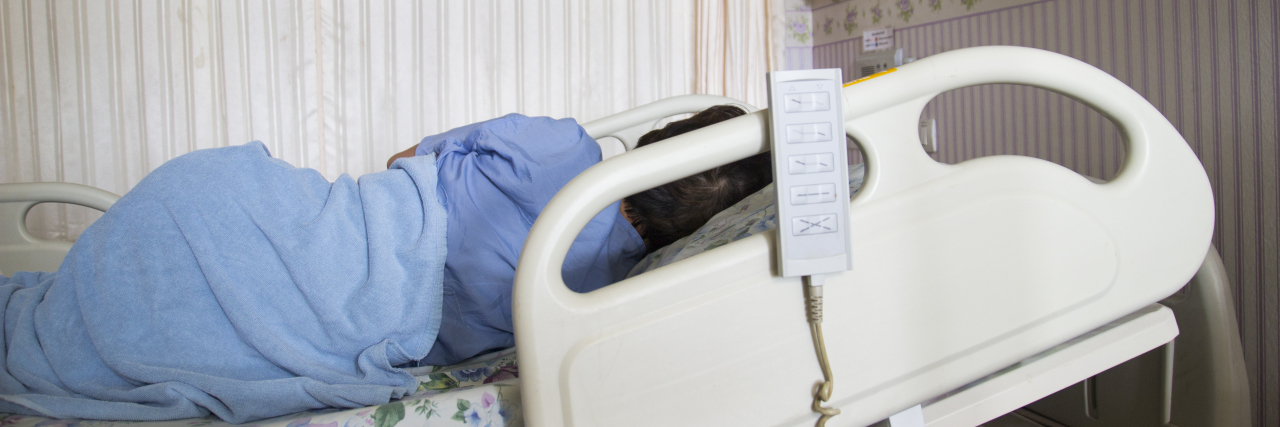Being hospitalized on a mental health unit, or what they’re increasingly calling a “behavioral health unit,” is certainly not fun. There are the locked doors, the 15 minute checks and the repetitive hospital food with no knives. Yet sometimes that is the level of care necessary to keep someone safe and help them. So although it comes with its own stressors, a hospitalization can be beneficial to someone’s treatment.
Fortunately, after one hospitalization you start to learn the ropes of how everything works and you get more comfortable with the process. But perhaps this is your first hospitalization. If so, I’d like to help. Here are 10 tips for how to get through the hospitalization and even make the most of it:
1. Be assertive with what you need.
While in the hospital, you suddenly lose a lot of freedom. For example, I had to ask to have the bathroom unlocked every time I wanted to use it for the first 24 hours. As someone who struggles with being assertive, this was incredibly difficult. But you deserve to have your needs met. If you also struggle with being assertive, try pushing yourself a little bit at a time to ask for something you want or need. It will get easier with practice.
2. Make a list of questions.
Something I found incredibly helpful was making a list of questions I had. This worked for things I wanted to be assertive about and ask for, and also for questions I had for the doctors. Then I didn’t have to worry about remembering my questions, but I had my list with me to remind me. If it helps, you can even hand someone your list of questions. Plus, it feels great to check things off.
3. Talk in groups.
I tend to be a quiet person, so it takes me a while to open up to people. I also tend to be quite sensitive though, so when others would talk about their problems I would absorb their pain as well. And since I wasn’t expressing myself, this led to a lot of extra stress. What worked was talking and being part of the group. Take a chance by being vulnerable and get some stuff off your chest! The group therapy is there to be a supportive environment, and often it feels great to participate by talking too. Plus, you sometimes get great feedback.
4. Hang out in common areas.
When it’s not time for a scheduled activity, it can be tempting to hole yourself up in your room. What this can lead to is just sitting by yourself ruminating, which is not great for your mental health. What can be healthier, though perhaps uncomfortable at first, is sitting in a common area with other patients. Then you get the chance to talk with and relate to others who are likely to understand what you’re going through.
5. Partake in a hobby.
There is a lot of time to fill between and after groups when on a behavioral health unit. You can start to feel bored very quickly. This is when it’s beneficial to not forget about hobbies you enjoyed before being hospitalized, or perhaps even trying a new hobby. I did a ton of Sudokus when I was in the hospital and even taught some other patients how to do them. I also read a lot, so ask if someone can bring you a book.
6. Order the mac and cheese.
There is something that can be simply soothing about eating comfort food. And you deserve that comfort. Almost every hospital has mac and cheese as an option. So order or make some late night mac and cheese. You deserve it, and it’s good.
7. Eat that ice cream.
The same goes for ice cream. You have been through a lot, so you deserve a treat. Technically, I think it’s being skillful to treat yourself and counts as self-care.
8. Ask for earplugs.
I don’t know why, but I almost always seem to get a roommate who snores. Fortunately, the nurses have earplugs you can use. If you find all the noise of a hospital hard to sleep through — and who wouldn’t — ask for some earplugs! And if you find being assertive difficult, see numbers one and two. You deserve to have your needs met.
9. Be honest.
It can be tempting to tell the doctors and nurses that everything is suddenly fine because you want to get the heck out of there and go home. For your own sake, please don’t do this. Please be honest with the staff about any problems or side effects you are having. When they ask about suicidal thoughts, tell the truth. Their goal is to help you, and they can’t help unless you are honest.
10. Trust the process.
Hospitalizations can be scary and overwhelming to say the least, but at the end of the day the goal is to keep you safe and make you feel better. Depression and other mental illnesses lie to us and tell us there is no hope or things will never improve. But sometimes you have to listen to that tiny voice of hope and give it a chance by trusting the process. You can do this. I believe in you.
If you or someone you know needs help, visit our suicide prevention resources page.
If you need support right now, call the National Suicide Prevention Lifeline at 1-800-273-8255, the Trevor Project at 1-866-488-7386 or reach the Crisis Text Line by texting “START” to 741741.
Getty image via psisa

